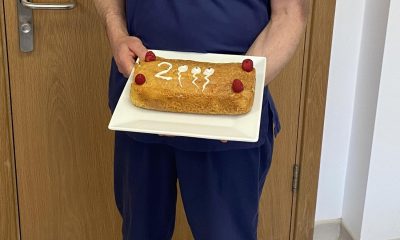By Stephen Beech via SWNS
Knee replacement patients who had acupuncture needles inserted into their ears during surgery reported less pain, according to a new study.
Scientists also said they needed to take fewer potentially addictive opioid painkillers after undergoing total knee replacement surgery.
The study showed that two-thirds of patients who received acupuncture during surgery (65 percent) achieved a low-dose or opioid-free post-operative experience, compared to just one in 11 patients outside of the study (nine percent).
“Total knee replacements are one of the most common operative procedures in the United States and often very painful, so there’s a great need to explore non-opioid pain relief techniques for this type of surgery," said lead author Dr. Stephanie Cheng, Assistant Professor of clinical anesthesiology at Weill Cornell Medicine in the US.
“Acupuncture is extremely safe and can help reduce pain with few unwanted side effects, but it has not been well researched as part of surgical anesthesia.”
The study included 41 patients undergoing primary total knee replacement at the Hospital for Special Surgery in New York City.
All patients received the institution’s standard opioid-sparing multimodal analgesic protocol, with the addition of electroacupuncture - a modified form of traditional acupuncture that applies a small electric current to thin needles that are inserted at known acupuncture points on the body.
The acupuncture was administered during surgery by Dr. Cheng, who is board-certified in medical acupuncture, to eight specific points in the ear to provide targeted pain relief in the knee.
With the addition of acupuncture, the majority of patients had a significant reduction in postoperative opioid use, compared to historical controls.
The findings showed that 65 percent of patients maintained a low-dose opioid regimen of 15 oxycodone pills or less (57.5 percent) or remained completely opioid-free (7.5 percent) from induction of anesthesia to 30 days after surgery.
Historically, only nine percent of patients outside of the study maintained a low-dose or opioid-free regimen post-surgery. All patients studied discontinued opioid use after 30 days following surgery.
“Our study shows that if a trained medical acupuncturist is available to perform acupuncture in the operating room, it can help patients with post-operative pain recovery," said Cheng. “Most studies fail to incorporate non-traditional techniques, such as acupuncture, to help decrease the dependence on opioid medications for postoperative pain control. Additional research is needed to further define acupuncture’s effects and encourage its use in all aspects of disease treatment."
The findings are due to be presented at the Anesthesiology annual meeting in San Diego.

 Parenting1 week ago
Parenting1 week ago
 Lifestyle7 days ago
Lifestyle7 days ago
 Wildlife3 days ago
Wildlife3 days ago
 Good News4 days ago
Good News4 days ago
 Health4 days ago
Health4 days ago
 Broadcast1 week ago
Broadcast1 week ago
 Environment1 week ago
Environment1 week ago
 Work2 days ago
Work2 days ago





















